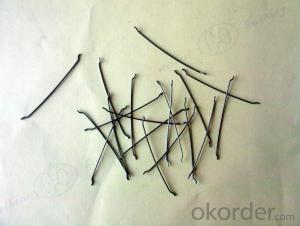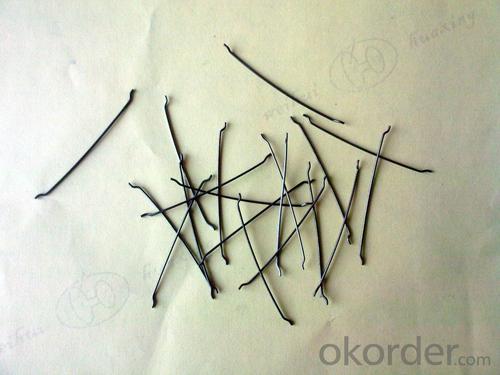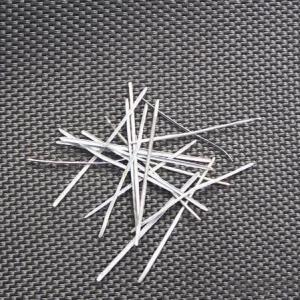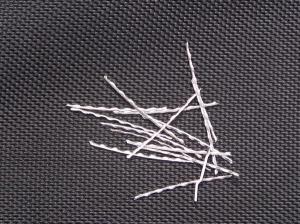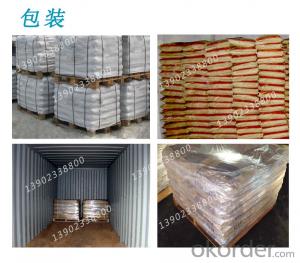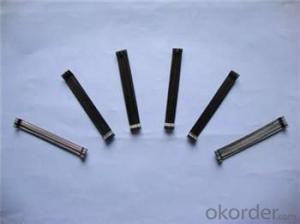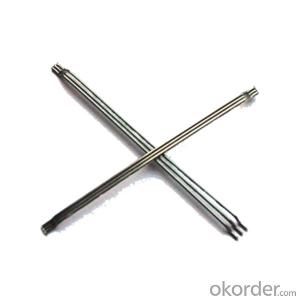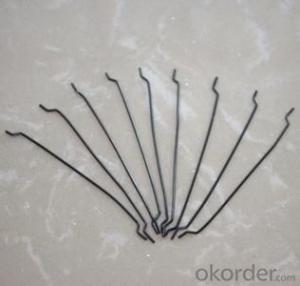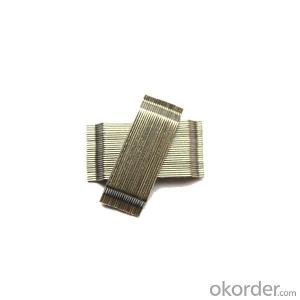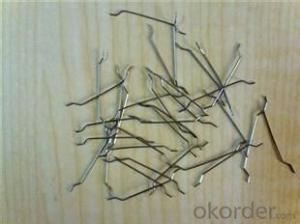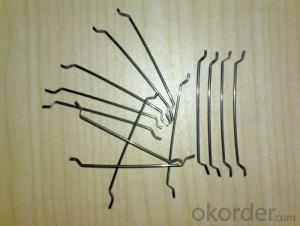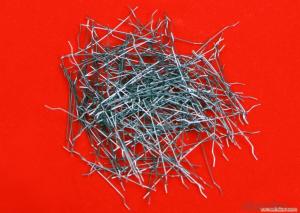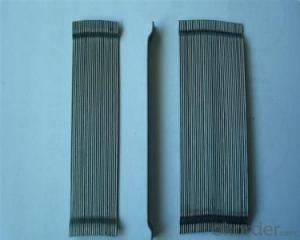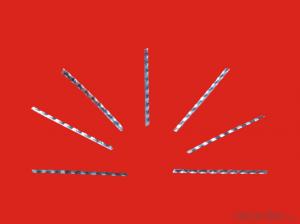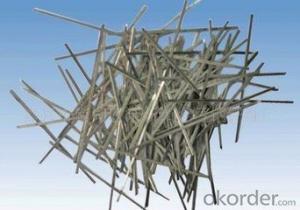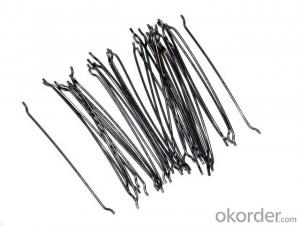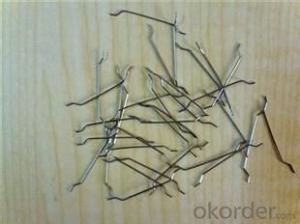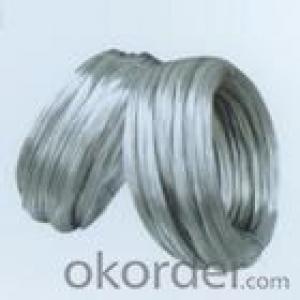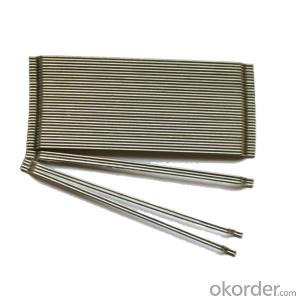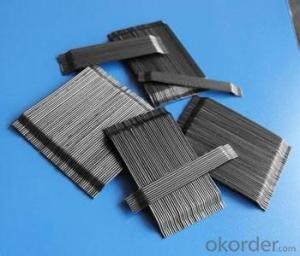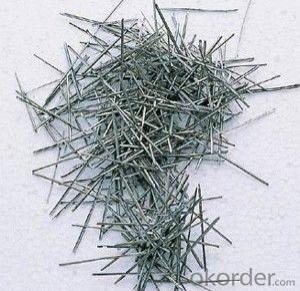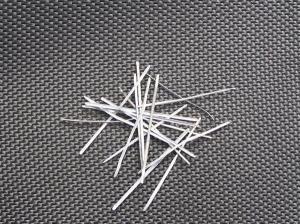Melt Extract Stainless Steel Fiber - Steel Fiber Loose CNBM Company China
- Loading Port:
- Tianjin
- Payment Terms:
- TT OR LC
- Min Order Qty:
- 2000 kg
- Supply Capability:
- 30000 kg/month
OKorder Service Pledge
OKorder Financial Service
You Might Also Like
Quick Details
Place of Origin: Jiangsu, China (Mainland)
Model Number: HT-MC
Material: Color Steel
certificated: ISO 9001
Specifications
1.material: steel plate
2.shape: waved
3.thickness: 0.5-13mm
4.length:35-5mm
5.tensile strength: >800Mpa
Xorex Steel Fiber
The milled steel fiber is made of high-strength steel wire through milling process, which makes the wire into wave shape to increase the touching area with concrete. By tightly binding with the mortar, the steel fiber can greatly enhance the performance of steel-fiber reinforced concrete, with strong cracking and shearing resistance, and tensile strength.
Specification | Thickness (mm) | Width (mm) | Length (mm) | Length- diameter l/d | Tensile strength (MPa) | Bending property |
T×W×L | 0.5-1.3 | 2-4 | 35-50 | 70~38 | ≥600 | ≥3 |
Item | Ordinary concrete | Steel fiber reinforced concrete | Enhancement rate |
C30(RC) | C30(SFRC) | (,%,) | |
Tensile strength | 3,5MPa | 5,39-7MPa | 54-100 |
Compressive strength | 31,2MPa | 32,5-40MPa | 4,4-28,2 |
Ultimate bending strength | 5,5MPa | 9,18-13,75MPa | 67-520 |
First crack bending strength | 4,88MPa | 7-8Mpa | 43-100 |
First crack strength | 8,85N,m | 23-53N,m | 160-500 |
Impact and fatigue strength | 5,96/cm2 | 53,3-91/m2 | 8-15 times |
Impermeability grade | P6~p12 | 0,5 ~2,5 times |
Type of steel fiber reinforced concrete | length/mm | L/D |
For general purpose | 20~60 | 30~80 |
Jet concrete | 20~35 | 30~80 |
Joints of seismic frame | 35~60 | 50~80 |
Railway sleeper | 30~35 | 50~70 |
Layered composite pavement | 30~120 | 60~100 |
Content of steel fiber | Sand percentage (%) | Water cement ratio | Slump (cm) | Unit amount (kg/m3) | ||||
Steel fiber | Cement | Gravel | Sand | Water | ||||
1—1.2 | 40 | 0.45 | 3—5 | 78 | 400 | 1233 | 819 | 180 |
Content of steel fiber | Sand percentage (%) | Water cement ratio | Slump (cm) | Unit amount (kg/m3) | ||||
Steel fiber | Cement | Gravel | Sand | Water | ||||
1.5—1.8 | 48 | 0.45 | 3—5 | 120 | 450 | 1210 | 1035 | 200 |
Picture
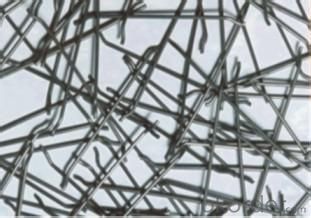
Steel fiber
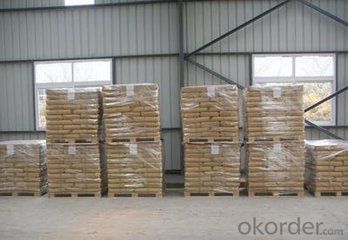

FAQ
certificated: ISO 9001
Technical advantages of Daye steel fiber:
A. Improve mechanical performance of concrete
B. Provide uniform distribution throughout concrete with excellent mixing
C. No balling or caking by adopt correct mixing method
D. Reduce concrete volume
E.Save construction time and cost
F.Reduce excavation volume
G.Available for jointless floor.
- Q: How does melt extract stainless steel fiber improve the resistance to impact loading in concrete?
- The unique properties and characteristics of melt extract stainless steel fiber lead to a significant improvement in the resistance of concrete to impact loading. These fibers act as reinforcement when added to concrete mixtures, dispersing throughout the mixture and creating a three-dimensional network that strengthens the overall structural integrity. One way in which melt extract stainless steel fiber enhances impact resistance is by increasing the tensile strength of the concrete. Concrete is strong in compression but weak in tension. However, the addition of stainless steel fibers improves its tensile strength, allowing it to withstand impact forces better. These fibers bridge cracks and distribute the load, preventing crack propagation and reducing the risk of failure under impact loading. Moreover, the high aspect ratio of melt extract stainless steel fibers, combined with their excellent bonding properties with the concrete matrix, creates a strong interfacial bond. This bond effectively transfers impact energy from the concrete to the fibers, dissipating the energy and preventing localized damage. As a result, concrete with stainless steel fibers exhibits improved impact resistance, withstanding higher impact loads without significant damage or failure. Additionally, melt extract stainless steel fibers enhance the durability of concrete by reducing the formation and spread of microcracks. These fibers provide a reinforcement system that prevents cracks from widening and spreading, improving the longevity and service life of the concrete structure. By mitigating the effects of impact loading, the fibers contribute to reducing maintenance costs and extending the lifespan of the concrete. In conclusion, melt extract stainless steel fiber enhances the resistance of concrete to impact loading by increasing its tensile strength, preventing crack propagation, dissipating impact energy, and improving durability. These fibers play a crucial role in strengthening the overall structural integrity of concrete, making it more robust and resilient against impact forces.
- Q: What are the advantages of using melt extract stainless steel fiber in shotcrete applications?
- There are numerous benefits to utilizing melt extract stainless steel fiber in shotcrete applications. Firstly, the inclusion of these fibers significantly boosts the overall strength and durability of the shotcrete. Acting as reinforcement, the fibers add extra tensile strength to the material. This proves especially crucial in shotcrete applications that experience high levels of stress or impact. Secondly, the utilization of stainless steel fiber in shotcrete enhances its resistance to cracking and shrinkage. The fibers aid in the even distribution of stress throughout the material, reducing the likelihood of cracks. This proves particularly advantageous in shotcrete applications that need to withstand harsh environmental conditions or heavy loads. Furthermore, melt extract stainless steel fiber improves the material's resistance to corrosion. Stainless steel is renowned for its exceptional corrosion resistance properties, making it an ideal choice for shotcrete applications exposed to aggressive environments like marine structures or chemical plants. In addition, the incorporation of stainless steel fiber in shotcrete can contribute to an extended lifespan for the structure. By reducing cracking and enhancing durability, the material becomes more resistant to deterioration over time. This can result in significant cost savings in terms of maintenance and repair. Lastly, melt extract stainless steel fiber offers ease of application. The fibers can be effortlessly mixed into the shotcrete mixture, seamlessly integrating into the construction process. This simplifies the overall installation process and reduces the need for additional reinforcement techniques. To conclude, the advantages of using melt extract stainless steel fiber in shotcrete applications encompass improved durability, increased resistance to cracking and corrosion, an extended lifespan for the structure, and ease of application. These benefits establish it as the preferred choice for various shotcrete projects, ensuring long-term performance and cost-effectiveness.
- Q: Can melt extract stainless steel fiber be used in concrete overlays?
- Yes, melt extract stainless steel fiber can be used in concrete overlays.
- Q: Steel fiber prices? (recent price)
- Wire cut type: general price at 9000-14000 yuan / ton. (packaging and materials are not the same, the price difference is also large, about 8000 is bulk, about 14000 is glue dip loading)
- Q: Can melt extract stainless steel fiber be used in pre-stressed concrete applications?
- Yes, melt extract stainless steel fiber can be used in pre-stressed concrete applications. The high tensile strength and corrosion resistance of stainless steel fibers make them suitable for reinforcing concrete structures that are subjected to pre-stressing forces. These fibers can enhance the durability and structural integrity of pre-stressed concrete elements, providing additional strength and preventing cracking or failure under tension.
- Q: How does melt extract stainless steel fiber enhance the resistance to impact loads in concrete?
- The resistance to impact loads in concrete is enhanced by melt extract stainless steel fiber, which possesses unique properties and behavior. When incorporated into concrete, stainless steel fibers disperse evenly throughout the mixture, forming a three-dimensional reinforcement network. This network functions as a secondary reinforcement system, augmenting the concrete's capacity to withstand impact loads. The impact resistance is greatly improved by the high tensile strength and ductility of stainless steel fibers. In contrast to traditional reinforcement materials like steel bars or mesh, stainless steel fibers possess significantly higher tensile strength, enabling them to effectively distribute impact energy. Consequently, cracks are prevented, and the overall durability of the concrete is enhanced. Furthermore, stainless steel fibers exhibit exceptional bonding characteristics with the concrete matrix. This robust bond ensures that the fibers remain securely in place even under intense impact loads, effectively transferring the load from the concrete surface to the fiber reinforcement system. This mechanism facilitates the dissipation of impact energy, reducing the risk of surface spalling or cracking. Moreover, the distinctive aspect of melt extract stainless steel fibers lies in their ability to withstand elevated temperatures. This attribute is particularly significant in scenarios where impact loads may coincide with high temperatures, such as fire incidents or explosions. Even under such extreme conditions, the structural integrity of the stainless steel fibers remains intact, continuously reinforcing the concrete and augmenting its resistance to impact. In conclusion, melt extract stainless steel fiber enhances the resistance to impact loads in concrete by establishing a robust and uniform reinforcement network. Its high tensile strength, exceptional bonding characteristics, and capacity to withstand elevated temperatures collectively contribute to the overall durability and impact resistance of the concrete.
- Q: What are the limitations of using melt extract stainless steel fiber?
- Using melt extract stainless steel fiber comes with several limitations. To begin with, the high cost is a major drawback. Compared to other types of fibers like carbon or glass fibers, melt extract stainless steel fiber is more expensive. This can make it less economically viable for certain applications, especially in industries with tight budget constraints. Secondly, the handling and installation of melt extract stainless steel fibers can be challenging. These fibers are typically very fine and can easily become airborne during mixing or spraying processes. This poses health and safety risks to workers, as inhaling these fibers can cause respiratory issues. To ensure worker safety, special precautions and protective measures must be taken. Additionally, melt extract stainless steel fibers may have limited performance in certain environments. They may not be suitable for applications exposed to high temperatures or corrosive chemicals, as they can lose their strength and durability under such conditions. In these demanding environments, alternative fibers like ceramic or basalt fibers may be more suitable. Furthermore, the effectiveness of melt extract stainless steel fibers in improving concrete's mechanical properties may vary depending on factors like fiber length, aspect ratio, and fiber dispersion. Achieving uniform distribution and alignment of fibers throughout the concrete matrix can be challenging, and this can impact the overall performance and effectiveness of the fiber reinforcement. Lastly, the aesthetic properties of concrete containing melt extract stainless steel fibers may be affected. Since these fibers are metallic, they can alter the appearance and texture of the concrete surface. This may not be desirable for applications where visual appeal is important, such as architectural or decorative concrete. In conclusion, while melt extract stainless steel fibers offer certain advantages in terms of strength and durability improvement, they also have limitations in terms of cost, handling, performance in extreme conditions, fiber dispersion, and aesthetic impact. These factors should be carefully considered when deciding whether to use this type of fiber in a specific application.
- Q: Can melt extract stainless steel fiber be used in sound barrier walls?
- Yes, melt extract stainless steel fiber can be used in sound barrier walls. The stainless steel fiber helps enhance the structural integrity and acoustic performance of the walls by reducing sound transmission.
- Q: What is the effect of melt extract stainless steel fiber on the autogenous shrinkage of concrete?
- The melt extract stainless steel fiber has a significant effect on reducing the autogenous shrinkage of concrete. Autogenous shrinkage refers to the inherent self-desiccation and subsequent volume reduction of concrete due to the hydration process. When stainless steel fibers are added to concrete, they create a three-dimensional reinforcement network within the matrix. This network helps to enhance the overall tensile strength and ductility of the concrete. Additionally, the stainless steel fibers act as micro-reinforcements, preventing the formation and propagation of cracks during the early stages of concrete hydration. By reducing the formation of cracks, the stainless steel fibers minimize the potential for moisture loss from the concrete. This, in turn, reduces the autogenous shrinkage. The stainless steel fibers act as a barrier, hindering the evaporation of water from the concrete and maintaining a higher moisture content within the matrix. Moreover, the melt extract stainless steel fibers have a higher aspect ratio and better dispersion compared to other types of fibers, such as polypropylene or carbon fibers. This improved dispersion ensures a more uniform distribution of the fibers throughout the concrete, further enhancing their effectiveness in reducing autogenous shrinkage. Overall, the addition of melt extract stainless steel fibers to concrete significantly reduces the autogenous shrinkage by preventing crack formation and minimizing moisture loss. This results in a more durable and crack-resistant concrete structure.
- Q: How does melt extract stainless steel fiber affect the abrasion resistance of concrete?
- Melt extract stainless steel fiber is known for significantly enhancing the abrasion resistance of concrete. When added to concrete mixes, these fibers create a three-dimensional reinforcement network within the material, improving its overall strength and durability. The unique properties of stainless steel, such as high tensile strength and excellent corrosion resistance, contribute to the enhanced abrasion performance of the concrete. The addition of melt extract stainless steel fiber to concrete helps to reduce the formation of microcracks and control the propagation of existing cracks. As a result, the concrete becomes more resistant to wear and tear caused by abrasion. The fibers act as reinforcement, bridging the gaps between aggregates and providing additional tensile strength to the concrete. By incorporating stainless steel fibers, the concrete gains a higher resistance to surface erosion, impact, and friction. This is particularly beneficial in high-traffic areas, such as industrial floors, highways, parking lots, and airports, where abrasion is a common issue. The improved abrasion resistance ensures that the concrete remains intact and maintains its structural integrity over an extended period. Furthermore, melt extract stainless steel fibers also enhance the overall lifespan of concrete structures. By reducing the need for repairs and maintenance due to abrasion damage, these fibers help to prolong the service life of concrete, resulting in cost savings and reduced environmental impact. In summary, melt extract stainless steel fiber greatly enhances the abrasion resistance of concrete by reinforcing the material, reducing crack formation, and improving its overall strength and durability. This makes it an excellent choice for applications where abrasion is a concern, leading to longer-lasting and more resilient concrete structures.
Send your message to us
Melt Extract Stainless Steel Fiber - Steel Fiber Loose CNBM Company China
- Loading Port:
- Tianjin
- Payment Terms:
- TT OR LC
- Min Order Qty:
- 2000 kg
- Supply Capability:
- 30000 kg/month
OKorder Service Pledge
OKorder Financial Service
Similar products
Hot products
Hot Searches
Related keywords
